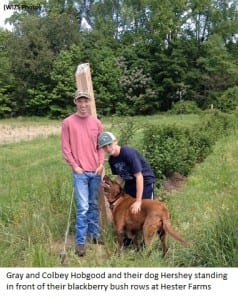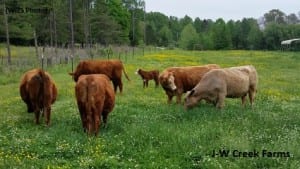Our Local Farmers
The past two segments have taken a look at the Vance County Regional Farmers Market and restaurants in our area that serve locally grown food. In this segment, the focus shifts to a few of the farmers that can be found in connection with these restaurants and at the Farmers Market.
We first visited with Gray and Colbey Hobgood of Hester Farms located in the Dabney district of Vance County. Hester Farms is predominately a fruit and vegetable farm. They don’t advertise for people to come out and pick their own produce, but, if someone asks, they will usually allow it. Gray and Colby began farming by helping their grandfather when they were early teenagers. Their grandfather still farms wheat and soybeans, but the two brothers have taken over most of the fruit and vegetable portion of it. This year their strawberries did so well at the Vance County Farmers Market they sold out almost every selling day. The Hobgoods have a hive of bees they got from a beekeeper in Louisburg that they use to pollinate their produce. Gray Hobgood said, “We aren’t certified organic because it’s expensive to get certain certifications, but we don’t use pesticides on our crops. We wouldn’t want to risk the health of our pollinators or customers.” Blueberries are ready, and they’ll also have blackberries, tomatoes, peppers, and various other vegetables in the coming summer. Customers can find them every Wednesday and Saturday morning at the Vance County Farmers Market.
early teenagers. Their grandfather still farms wheat and soybeans, but the two brothers have taken over most of the fruit and vegetable portion of it. This year their strawberries did so well at the Vance County Farmers Market they sold out almost every selling day. The Hobgoods have a hive of bees they got from a beekeeper in Louisburg that they use to pollinate their produce. Gray Hobgood said, “We aren’t certified organic because it’s expensive to get certain certifications, but we don’t use pesticides on our crops. We wouldn’t want to risk the health of our pollinators or customers.” Blueberries are ready, and they’ll also have blackberries, tomatoes, peppers, and various other vegetables in the coming summer. Customers can find them every Wednesday and Saturday morning at the Vance County Farmers Market.
Hester Farms uses plant plugs supplied by Aaron’s Creek Farms, a wholesale plant nursery located in Buffalo Junction, which is in Mecklenburg County, VA. The nursery was established in 1964 by George W. Gordon, III. They offer delivery routes within a 150 mile radius for their bedding plants for quantity orders. They also maintain their own fleet of delivery trucks and provide state-of-the-art handling. Grower pick-ups are welcomed. Plant plugs can be Fed Exed anywhere in the USA. Delivery routes will accommodate orders within the same week, usually within 48 hours. They guarantee a safe delivery of plants.
The next farm on our list is Harvey Hills Farms. It is a family owned farm in Oxford, NC. In their fourth year of operation, the farm is a registered NC plant nursery that uses GAP certified practices even though they are not certified GAP (which stands for Good Agricultural Practices). They are a proud member of the Goodness Grows in North Carolina program. All of their vegetables and herbs are certified organic and come from Non-GMO seed. They also use organic fertilizer on all of their crops. The family has over 100 layer chickens that are pasture raised for those interested in farm fresh eggs. These eggs supply a local restaurant in Raleigh called Relish. For the spring and summer season, customers can go to the farm by appointment Monday-Friday for plant sales. Customers can also find them at the Vance County Farmers Market on Wednesday and Saturday mornings. Customers may also pre-order and pick up at the Farmers Market. In the fall, Harvey Hills Farms has a fun set up referred to as Harvest Days, which is a plant stand complete with pumpkins, mums, a hay bale maze for the kids, fresh mountain apples and cider, and fun fall harvest decorations for sale. It is open every weekend from the last weekend of September to the last weekend in October. Admission is free. For more details visit www.HarveyHills.com.
Next up, J-W Creek Farms, also a family owned farm and also located in Oxford, provides locally pasture raised beef and  eggs. There are no added hormones or antibiotics in their beef. The animals are born and raised right there on the farm. Owner Janice Murphy said, “Our calves get to stay with their mothers until the mother decides when it is time to wean it. The meat people buy in grocery stores is meat from a cow that was usually taken from the mother before it should have been when it was a calf. Also, these same cows were raised in a feed lot, which means the cow was contained inside an area that is the size of a carport and wasn’t free to roam around in a pasture the way a cow should be able to. We feel that is no life for a cow. It is very important to us that our animals are raised humanely.” J-W Creek Farms also have a variety of eggs such as Guinea, Red Star, Americana, Dominique, and Rhode Island Red Hens.
eggs. There are no added hormones or antibiotics in their beef. The animals are born and raised right there on the farm. Owner Janice Murphy said, “Our calves get to stay with their mothers until the mother decides when it is time to wean it. The meat people buy in grocery stores is meat from a cow that was usually taken from the mother before it should have been when it was a calf. Also, these same cows were raised in a feed lot, which means the cow was contained inside an area that is the size of a carport and wasn’t free to roam around in a pasture the way a cow should be able to. We feel that is no life for a cow. It is very important to us that our animals are raised humanely.” J-W Creek Farms also have a variety of eggs such as Guinea, Red Star, Americana, Dominique, and Rhode Island Red Hens.
Another plant nursery on our list is Franklin Brothers, located in Henderson, NC. They grow vegetable transplants and ornamentals and grow most of their plant and produce on their farm. They use organic practices but are not certified organic. Saving the pollinators is very important to Franklin Brothers. Sam Franklin of Franklin Brothers said, “We minimize the use of pesticides on our plants and also sell plants that contribute to the health of the pollinators.” They try to provide customers with the highest quality plants to ensure gardening success. They are dedicated to loyal customers and will go out of their way to ensure the customers gardening experience will be a good one.
The last farm on our list for now is Bender Farms Inc. It is owned by Jeff and Lisa Bender and located in Norlina, NC. They are one of the major farmers who are a part of the Farm-to-School initiative to bring fresh chopped veggies to local schools. Bender Farms is also working with Standard Foods in Raleigh and has collaborated to make a Non-GMO corn meal that is for sale in that establishment.
If you are a farmer and have questions about certain certifications, Paul McKenzie the Agricultural Extension Agent with the Vance County Extension Service can help you. He is responsible for educating the public on environmentally sound garden and landscape management, training pesticide applicators, educating forest landowners on sound management practices, and assisting farmers with crop production and pest management. The Cooperative Extension can provide technical advice on how to pursue organic certification or GAP certification. The cost of doing so can be significant, in terms of paying an inspector/auditor and also in terms of the time involved with record keeping. In order to justify that cost, a farmer needs to have a market that will pay a premium price. McKenzie said, “I think one of our biggest challenges is educating the public about eating with the seasons, and introducing people to some of the delicious and nutritious produce we can grow here. Things like cabbage, kale, and muscadine grapes are chock full of nutrients, but many people aren’t accustomed to eating them. People expect to go to a restaurant and find the same menu year round. But when we eat local seasonal produce, the availability of products changes throughout the year. To me there’s a real benefit to adding all that variety to our plates, in terms of taste and nutrition.”
So there you have it. Support a local farmer. Get involved in the farm-to-table movement. If you’re eating out, ask where your food comes from and how it was raised. Take the kids, visit your local farmers market, and try something new this weekend. Customers can always ask farmers how they would suggest preparing a vegetable or fruit if it’s something they’ve never tried. Be adventurous! Who knows? You may just find something that could become your family’s new favorite!
WIZS Staff Writer – Jo Smith

